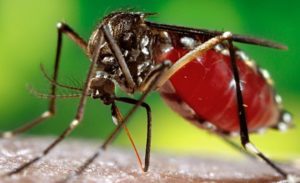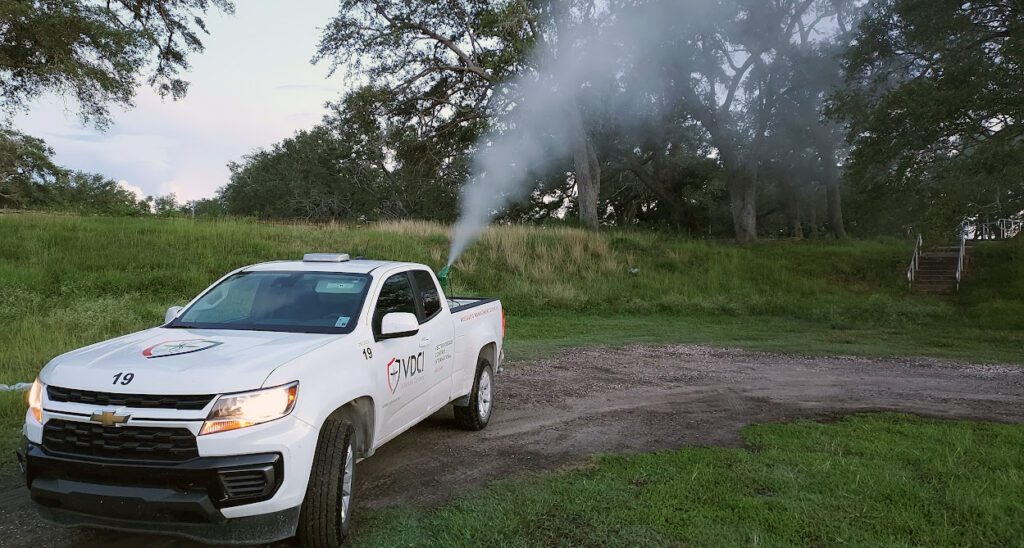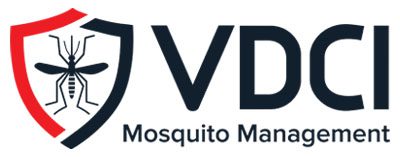We recently featured Aedes aegypti, the Yellow Fever Mosquito, in our Mosquito of the Month blog series. In the world of mosquito management, the species is challenging to beat – both as a topic of interest as well as a target with unique behaviors and habitats.
 The species has been the focus of much industry news this year because of its ability to transmit Zika virus, a new virus to the Western Hemisphere, that can have effects ranging from mild illness to severe birth defects. This mosquito, as well as many other mosquito species that can transmit human pathogens, has already had an enormous impact on human history. In addition to Zika virus, the Aedes aegypti is also known to carry several other mosquito-borne diseases that have potentially severe medical implications including, yellow fever, dengue, and chikungunya. The increased awareness of the species, combined with 2016 Zika outbreaks and fears of an outbreak in areas where the species resides, have helped influence social behavior and have had an enormous impact on our global economy. The recent effects are most evident as communities try to determine how to properly fund Zika control efforts to protect their residents and individuals evaluate their family planning timeline and reconsider where and when they travel. With all that fear riding on those tiny wings, proper management of this challenging species and the pathogens it carries is obviously prudent.
The species has been the focus of much industry news this year because of its ability to transmit Zika virus, a new virus to the Western Hemisphere, that can have effects ranging from mild illness to severe birth defects. This mosquito, as well as many other mosquito species that can transmit human pathogens, has already had an enormous impact on human history. In addition to Zika virus, the Aedes aegypti is also known to carry several other mosquito-borne diseases that have potentially severe medical implications including, yellow fever, dengue, and chikungunya. The increased awareness of the species, combined with 2016 Zika outbreaks and fears of an outbreak in areas where the species resides, have helped influence social behavior and have had an enormous impact on our global economy. The recent effects are most evident as communities try to determine how to properly fund Zika control efforts to protect their residents and individuals evaluate their family planning timeline and reconsider where and when they travel. With all that fear riding on those tiny wings, proper management of this challenging species and the pathogens it carries is obviously prudent.
What’s the challenge? Why can’t we use the same methodologies implemented with the management of other mosquitoes? The answer: Aedes aegypti, like all species, is unique and it has some behaviors that are different from many of the mosquitoes that we target in our efforts to control nuisance populations and protect public health. A separate approach must be considered for this species in both the adult and larval stages of its life-cycle.When considering best practices for the control of adult mosquitoes, many of the species we target, including those able to carry West Nile virus, actively host-seek at night. Meaning, once the sun sets, these mosquitoes are on the wing, actively searching for a blood meal. Aedes aegypti not only doesn’t actively host-seek, it bites primarily during the day. Aedes aegypti is a weak flyer that remains close to its larval home and uses an ambush style method of acquiring its preferred human blood meal: It waits for a person to enter its area where it can see and sense them. It will then cautiously approach its intended victim and extract its dinner, usually from a lower extremity. At night, we typically target the exposed, adult flying mosquitoes with aerial applications and ground applications using Ultra-Low Volume (ULV) mosquito adulticide. Unfortunately, during these applications, Aedes aegypti mosquitoes are resting under leaves and other areas where the pesticide is much less likely to contact them and do its job.

An additional complexity of Aedes aegypti is their preferred environment for laying eggs. The majority of mosquito species seek larger bodies of standing water to lay large numbers of eggs all at once. Aedes aegypti are “container breeders” and lay a few eggs at a time in just about anything that can hold water. The species has evolved to utilize natural containers, like bamboo and tree holes, to manmade containers ranging from discarded tires to backyard flower pots. The high quantity of small containers that the species can turn into a larval habitat requires an experienced team that understands the complexity of larvicide application as well as overall mosquito management for Aedes aegypti.
To control this species, you have to locate many small larval habitats and find the resting locations of the adults. Instead of wide-area applications of larvicides and adulticides that can cover a large area in a short time, it has typically been a much more intimate, labor intensive, and time consuming approach to managing their populations and mitigate disease.
Contact Us to Learn More About Effective Mosquito Management Strategies:
 Since 1992, Vector Disease Control International (VDCI) has taken pride in providing municipalities, mosquito abatement districts, industrial sites, planned communities, homeowners associations, and golf courses with the tools they need to run effective mosquito control programs. We are determined to protect the public health of the communities in which we operate. Our mosquito control professionals have over 100 years of combined experience in the field of public health, specifically vector disease control. We strive to provide the most effective and scientifically sound mosquito surveillance and control programs possible based on an Integrated Mosquito Management approach recommended by the American Mosquito Control Association (AMCA) and Centers for Disease Control and Prevention (CDC). VDCI is the only company in the country that can manage all aspects of an integrated mosquito management program, from surveillance to disease testing to aerial application in emergency situations.
Since 1992, Vector Disease Control International (VDCI) has taken pride in providing municipalities, mosquito abatement districts, industrial sites, planned communities, homeowners associations, and golf courses with the tools they need to run effective mosquito control programs. We are determined to protect the public health of the communities in which we operate. Our mosquito control professionals have over 100 years of combined experience in the field of public health, specifically vector disease control. We strive to provide the most effective and scientifically sound mosquito surveillance and control programs possible based on an Integrated Mosquito Management approach recommended by the American Mosquito Control Association (AMCA) and Centers for Disease Control and Prevention (CDC). VDCI is the only company in the country that can manage all aspects of an integrated mosquito management program, from surveillance to disease testing to aerial application in emergency situations.

